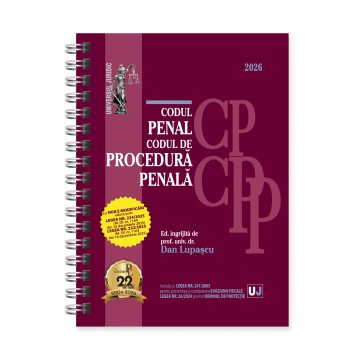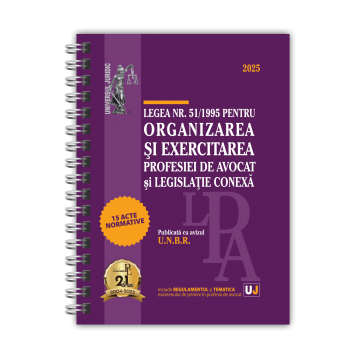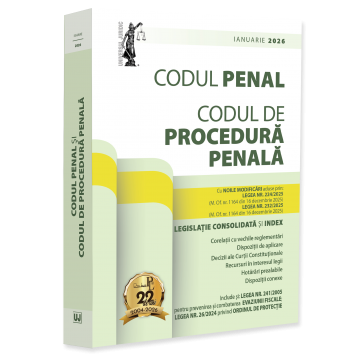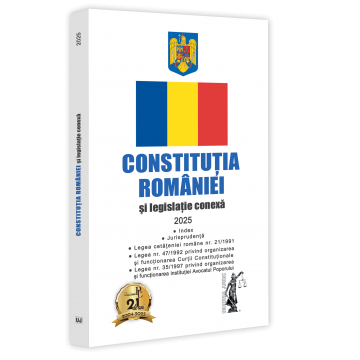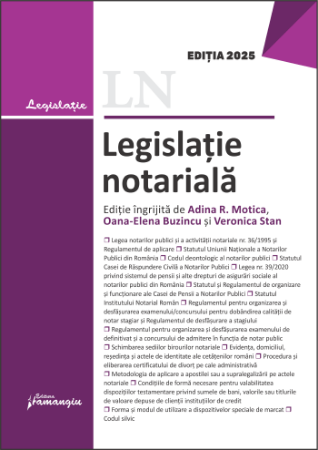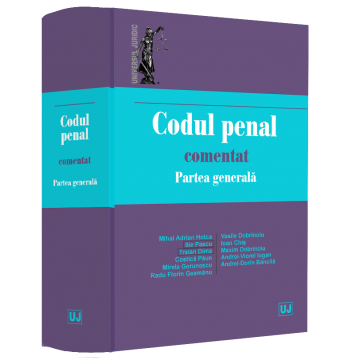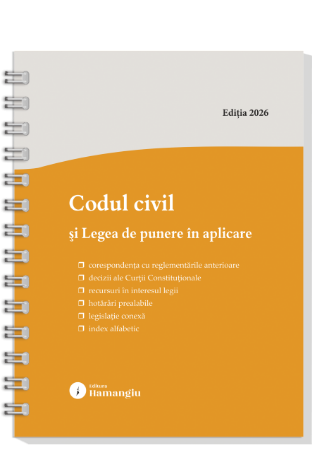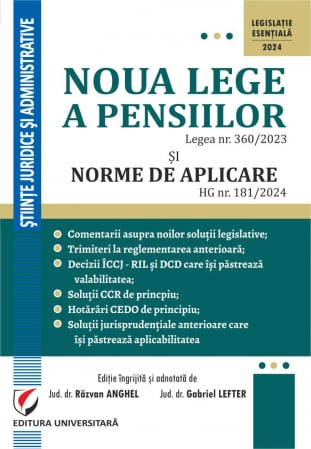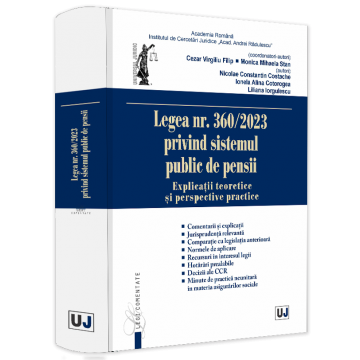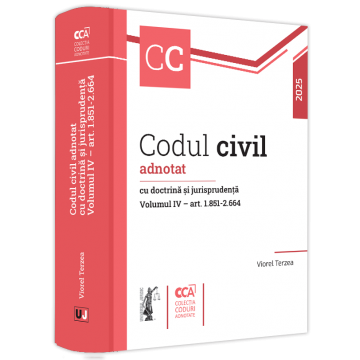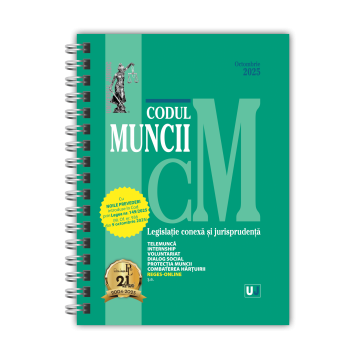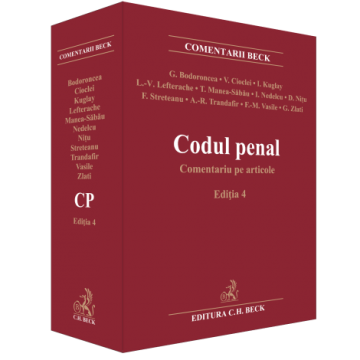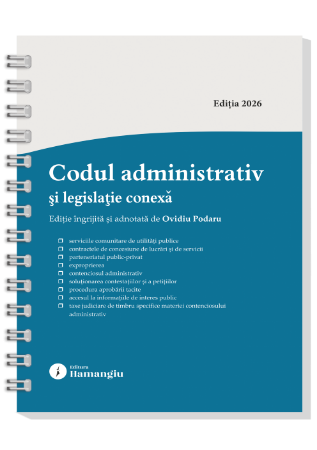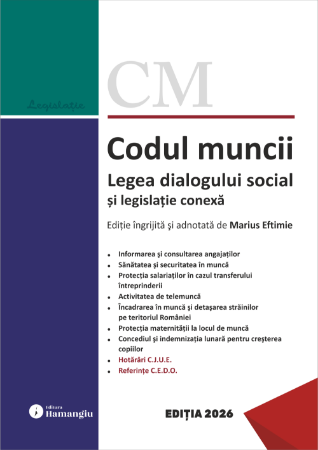Manuscript proposals: [email protected] / 0745 204 115 //// Tracking orders Individuals / Sales: 0745 200 357 / Orders Legal entities: 0721 722 783
Publisher: Editura Universitară
Author: Nicolae Ploesteanu
Edition: I
Pages: 342
Publisher year: 2023
ISBN: 978-606-28-1605-6
DOI: https://doi.org/10.5682/9786062816056
Product Code:
9786062816056
Do you need help?
0745 200 357
- Description
- Download (1)
- Authors
- Content
- More details
- Reviews (0)
The cessation of the effects of international treaties was my main concern during the years of doctoral preparation, and the approach to this field finally led me to conclude that throughout my university career my main attention will be directed towards this field. The explanation is very simple: the termination of international treaties is a living field that constantly offers us situations of interest for the states involved, and the researcher will always have the feeling that he is at the beginning of the road. Moreover, this is a reality if we take into account that the rules of international law must adequately express the changes that intervene in the life of the international community.
The termination of international treaties is addressed in the work in a broad way, because I considered that it responds more adequately to the situations that arise in international relations. By the broad way, I meant to include in the work both the causes of termination provided by the Vienna Convention on the Law of Treaties, as well as the causes of termination outlined in customary international law and developed in specialized literature; also, the concept of termination covers, according to the approach of the work, both the causes of actual termination of international treaties, but also the causes of their nullity, for the simple reason that regardless of the place of such treaties in theory, the result of finding the termination or nullity is similar in international life: the treaty no longer produces legal consequences. Such an approach highlights with greater accuracy the differences between international law and domestic law, distinctions undeniable by international jurists.
The shortcomings of the work are mainly due to three causes: since the time of the preparation of the work, there have been important transformations in the legal, political and social life of Romania, such as: the adoption of law no. 590/2003 regarding treaties and the formation of a new Romanian practice under this law, different from the old law no. 4/1991; Romania's accession to the European Union; the settlement by the International Court of Justice of the dispute between Romania and Ukraine. As a consequence, the work addresses too little, or from the perspective of the years 2003-2004, the issues related to the termination of the treaties in relation to the mentioned realities. However, in the last 4 years, I have tried to collect the bibliographic material necessary for a new, more complete edition, which corresponds to the demands of the present. It follows that in the coming years, I will work on such an edition, which will include a complete picture of Romania's practice and the situations that are circumscribed by the termination of international treaties to which the Romanian state is a party.
The work is intended for specialists in public international law, theorists or practitioners, and less so for the general public. However, some interested historians may find of interest my legal opinions regarding the dispute between Romania and Ukraine, formulated prior to its resolution, as well as a synthesis of the effects generated by the 1989 revolution in Romania on its practice in the field of treaties with an interest in the cessation or maintaining the force of some international treaties, as well as the situation of some international treaties as a result of the disintegration of some federal states in the vicinity of Romania, after the years 1989‑1990.
The termination of international treaties is addressed in the work in a broad way, because I considered that it responds more adequately to the situations that arise in international relations. By the broad way, I meant to include in the work both the causes of termination provided by the Vienna Convention on the Law of Treaties, as well as the causes of termination outlined in customary international law and developed in specialized literature; also, the concept of termination covers, according to the approach of the work, both the causes of actual termination of international treaties, but also the causes of their nullity, for the simple reason that regardless of the place of such treaties in theory, the result of finding the termination or nullity is similar in international life: the treaty no longer produces legal consequences. Such an approach highlights with greater accuracy the differences between international law and domestic law, distinctions undeniable by international jurists.
The shortcomings of the work are mainly due to three causes: since the time of the preparation of the work, there have been important transformations in the legal, political and social life of Romania, such as: the adoption of law no. 590/2003 regarding treaties and the formation of a new Romanian practice under this law, different from the old law no. 4/1991; Romania's accession to the European Union; the settlement by the International Court of Justice of the dispute between Romania and Ukraine. As a consequence, the work addresses too little, or from the perspective of the years 2003-2004, the issues related to the termination of the treaties in relation to the mentioned realities. However, in the last 4 years, I have tried to collect the bibliographic material necessary for a new, more complete edition, which corresponds to the demands of the present. It follows that in the coming years, I will work on such an edition, which will include a complete picture of Romania's practice and the situations that are circumscribed by the termination of international treaties to which the Romanian state is a party.
The work is intended for specialists in public international law, theorists or practitioners, and less so for the general public. However, some interested historians may find of interest my legal opinions regarding the dispute between Romania and Ukraine, formulated prior to its resolution, as well as a synthesis of the effects generated by the 1989 revolution in Romania on its practice in the field of treaties with an interest in the cessation or maintaining the force of some international treaties, as well as the situation of some international treaties as a result of the disintegration of some federal states in the vicinity of Romania, after the years 1989‑1990.
-
Termination of international treaties
Download
NICOLAE PLOESTEANU
Contents / 11
Keywords / 13
Summary / 13
Foreword / 21
Argumentum / 23
Chapter I
General considerations regarding international treaties / 27
1. Preliminaries / 27
2. Conclusion of international treaties / 32
2.1. Competence to conclude treaties / 32
2.2. Expression of consent to be bound by the treaty / 36
2.2.1. Signature / 36
2.2.2. Ratification / 39
2.2.3. Accession / 41
2.2.4. Acceptance and approval / 42
2.3. Amendment and modification / 43
2.4. Extent of legal obligations / 44
2.4.1. The Pacta sunt servanda principle / 44
2.4.2. Treaties and third countries / 44
Chapter II
General considerations regarding the termination of the effects of international treaties / 48
1. The concept of "termination and extinction of the effects of international treaties" / 48
2. Methods of terminating the effects of the treaty / 51
3. The relevance of custom in the field of termination of treaties / 53
3.1. Preliminary specifications / 53
3.2. Incompatibility between custom and treaty / 55
3.2.1. The importance of the problem in practice / 55
3.2.2. The problem of change through peace / 57
3.2.3. Lack of coding / 58
3.3. Intertemporal law / 59
3.3.1. A retrospective of specialized literature / 60
3.3.2. Interpretation of the treaty in the light of the new customary norm / 61
3.4. Priority between incompatible obligations / 64
3.4.1. Article 38 of the ICJ Statute and the priority between treaty and customary law / 65
3.4.2. Effects of integration into the European Union on the conventional system of the member states. / 66
4. Conclusions / 70
Chapter III
Termination of the effects of the international treaty. Coordinates / 72
1. Cessation of effects in time / 72
2. Effects of termination from a material point of view / 75
3. The automatic or non-automatic nature of the termination / 77
Chapter IV
Causes of actual termination of the effects of international treaties / 81
1. Execution of the international treaty / 81
1.1. Doctrinal aspects / 82
2. Expiration of the period for which the international treaty was concluded / 86
2.1. The insertion in the treaty of a clause with extinguishing effect embodied in the form of the final term. / 86
2.2. The intervention of the resolving condition / 87
3. Repeal of the treaty / 92
3.1. Preliminary considerations / 92
3.2. Types of abrogation / 97
3.2.1. The tacit repeal / 97
3.2.2. The problem of abrogating the treaty as a result of the development of the new custom / 118
3.3. Discussions regarding the form that the act signifying the cessation must take or how the fact of the cessation must be manifested in a formal aspect / 127
4. Denunciation / 129
4.1. Preliminaries / / 129
4.2. Regulation of the Vienna Convention (1969) / 131
4.3. The position adopted in the legal literature / 132
4.4. The legal regime of denunciation / 137
4.4.1. The content and legal characteristics of the denunciation / 137
4.4.2. The rules applicable to the denunciation form / 140
4.4.3. Types of denunciation / 141
4.4.4. Procedural rules in the matter of denunciation / 145
A. The competent body in the matter of denunciation / 145
C. The date on which the notification becomes effective / 149
D. Effects of denunciation / 151
4.4.5. The return of the denunciation and its ineffectiveness / 152
4.5. Denunciation or withdrawal from a treaty in the absence of a clause providing for such a possibility / 152
4.6. Suggestive examples, from international practice, of exercising the right to denunciation / 156
5. Renunciation of the treaty / 157
5.1. The hypotheses in which the renunciation is carried out / 158
5.2. Conditions and procedural aspects regarding the realization of the waiver / 159
5.3. The effects of giving up / 160
5.4. Suggestive situations in connection with renunciation / 160
6. Breach of obligations / 161
6.1. Preliminary considerations / 161
6.2. Theses regarding the substantiation of the right of withdrawal or denunciation of the treaty / 162
6.3. Romanian doctrine / 165
6.4. Foreign specialized literature / 167
6.5. Doctrinal positions regarding the right of the injured party to unilaterally terminate the treaty as a result of the violation of its provisions / 167
6.6. About the conditions of the right to terminate the treaty for the violation of its provisions / 169
6.7. The generating sources of the right to terminate the treaty as a result of its violation / 175
6.8. Special conditions and effects / 176
6.8.1. The situation of multilateral treaties / 178
6.9. Procedural aspects / 183
6.9.1. About how the legal effects of the breach of obligations are produced / 183
6.9.2. Discussions regarding the notice period / 185
6.9.3. Codification of the Vienna Convention / 186
A. Character of the rules of the Convention / 186
B. Treaties whose object is the protection of the individual / 188
6.9.4. The problem of legal treaties / 189
6.9.5. Judicial and diplomatic practice / 189
7. Impossibility of execution / 192
7.1. General considerations / 192
7.2. The concept of impossibility of execution / 194
7.3. The content of "impossibility of execution" or the scope of applicability / / 195
7.4. Demarcation between the impossibility of execution and the clause rebus sic stantibus / / 196
7.5. The nature and mode of operation of impossibility of execution / 198
7.5.1. Conditions of force majeure / 199
7.5.2. The link between cessation and international responsibility / 200
7.5.3. The effects of force majeure / 200
7.6. Judicial issues / 201
8. The war / 201
8.1. Preliminaries / 201
8.2. Hypotheses, conditions, effects of the war / 202
8.3. The special situation of some categories of treaties / 205
8.4. Codification of the Vienna Conventions / 206
8.5. Aspects from the practice of the states / 206
8.6. Conclusions / 207
9. Termination of the international legal personality of one of the parties / 209
10. The succession of states and the termination of international treaties / 212
10.1. Preliminaries / 212
10.2. The concept of succession of states in international treaties / 214
10.3. Forms of succession and effects on treaties / 216
10.3.1. The effects produced in the situation of the transformations that have taken place with regard to the quality of being a subject of international law / 216
10.3.2. The effects produced on the treaties when "transformations regarding the territorial structure of the states" intervene / 222
10.3.3. The case of the disappearance of states / 228
10.3.4. Formation of new states through "fusion" / 229
10.3.5. The succession hypothesis regarding the states formed as a result of the decolonization process / 232
10.4. Problems of the "succession of states" arising after 1989 in international relations. Special view on Romanian practice / / 235
10.4.1. The foundation of the "succession of states" in the context of the Romanian Revolution of 1989 / 235
10.4.2. Posing the problem / 237
10.4.3. Legal regulations in the matter / 237
10.4.4. Romanian practice / 238
11. Clause rebus sic stantibus / 256
11.1. Preliminaries / 256
11.2. The origin, appearance and development of the clause rebus sic stantibus / 260
11.3. Pacts are the servant and sacredness of treaties / 260
11.4. Doctrinal aspects regarding rebus sic stantibus / 263
11.5. Aspects from the doctrine and specialized literature / 272
11.6. The notion and setting the problem / 275
11.7. The foundation and legal significance of clause / 276
11.8. The legal nature of the rebus sic stantibus clause / 278
11.9. Critical considerations of the theories regarding the rebus sic stantibus clause / 279
11.10. Clause rebus sic stantibus in the practice of states / 281
11.11. The field of application of the rebus sic stantibus theory / 288
11.12. The relationship between custom and the fundamental change of circumstances / 289
11.12.1. Preliminaries / 289
11.12.2. Theory of the implicit term / 291
11.13. The legal effects of the application of the rebus sic stantibus clause / 292
11.14. Conclusions / 293
Chapter V
Causes of invalidity / 300
1. Preliminary notes / 300
2. Invalidity of consent according to domestic law / 302
3. Error / 305
4. Fraud / 306
5. Corruption of the representative of a state or an international organization / 308
6. Coercion of the representative of a state or an international organization / 309
7. Coercion of a state or an international organization by the threat of force / 310
A. Illegal nature of coercion / 310
B. Application of the rule in time / 312
C. The effect of the rules / 313
8. Violation of an imperative rule / 314
8.1. General regime / 314
8.2. The relationship between custom and jus cogens / 319
8.2.1. Jus cogens / 319
Chapter VI
The law of treaties and international responsibility / 321
1. General framework / 321
2. The distinction between "substantial" violations and other violations / 323
Conclusions / 325
Keywords / 13
Summary / 13
Foreword / 21
Argumentum / 23
Chapter I
General considerations regarding international treaties / 27
1. Preliminaries / 27
2. Conclusion of international treaties / 32
2.1. Competence to conclude treaties / 32
2.2. Expression of consent to be bound by the treaty / 36
2.2.1. Signature / 36
2.2.2. Ratification / 39
2.2.3. Accession / 41
2.2.4. Acceptance and approval / 42
2.3. Amendment and modification / 43
2.4. Extent of legal obligations / 44
2.4.1. The Pacta sunt servanda principle / 44
2.4.2. Treaties and third countries / 44
Chapter II
General considerations regarding the termination of the effects of international treaties / 48
1. The concept of "termination and extinction of the effects of international treaties" / 48
2. Methods of terminating the effects of the treaty / 51
3. The relevance of custom in the field of termination of treaties / 53
3.1. Preliminary specifications / 53
3.2. Incompatibility between custom and treaty / 55
3.2.1. The importance of the problem in practice / 55
3.2.2. The problem of change through peace / 57
3.2.3. Lack of coding / 58
3.3. Intertemporal law / 59
3.3.1. A retrospective of specialized literature / 60
3.3.2. Interpretation of the treaty in the light of the new customary norm / 61
3.4. Priority between incompatible obligations / 64
3.4.1. Article 38 of the ICJ Statute and the priority between treaty and customary law / 65
3.4.2. Effects of integration into the European Union on the conventional system of the member states. / 66
4. Conclusions / 70
Chapter III
Termination of the effects of the international treaty. Coordinates / 72
1. Cessation of effects in time / 72
2. Effects of termination from a material point of view / 75
3. The automatic or non-automatic nature of the termination / 77
Chapter IV
Causes of actual termination of the effects of international treaties / 81
1. Execution of the international treaty / 81
1.1. Doctrinal aspects / 82
2. Expiration of the period for which the international treaty was concluded / 86
2.1. The insertion in the treaty of a clause with extinguishing effect embodied in the form of the final term. / 86
2.2. The intervention of the resolving condition / 87
3. Repeal of the treaty / 92
3.1. Preliminary considerations / 92
3.2. Types of abrogation / 97
3.2.1. The tacit repeal / 97
3.2.2. The problem of abrogating the treaty as a result of the development of the new custom / 118
3.3. Discussions regarding the form that the act signifying the cessation must take or how the fact of the cessation must be manifested in a formal aspect / 127
4. Denunciation / 129
4.1. Preliminaries / / 129
4.2. Regulation of the Vienna Convention (1969) / 131
4.3. The position adopted in the legal literature / 132
4.4. The legal regime of denunciation / 137
4.4.1. The content and legal characteristics of the denunciation / 137
4.4.2. The rules applicable to the denunciation form / 140
4.4.3. Types of denunciation / 141
4.4.4. Procedural rules in the matter of denunciation / 145
A. The competent body in the matter of denunciation / 145
C. The date on which the notification becomes effective / 149
D. Effects of denunciation / 151
4.4.5. The return of the denunciation and its ineffectiveness / 152
4.5. Denunciation or withdrawal from a treaty in the absence of a clause providing for such a possibility / 152
4.6. Suggestive examples, from international practice, of exercising the right to denunciation / 156
5. Renunciation of the treaty / 157
5.1. The hypotheses in which the renunciation is carried out / 158
5.2. Conditions and procedural aspects regarding the realization of the waiver / 159
5.3. The effects of giving up / 160
5.4. Suggestive situations in connection with renunciation / 160
6. Breach of obligations / 161
6.1. Preliminary considerations / 161
6.2. Theses regarding the substantiation of the right of withdrawal or denunciation of the treaty / 162
6.3. Romanian doctrine / 165
6.4. Foreign specialized literature / 167
6.5. Doctrinal positions regarding the right of the injured party to unilaterally terminate the treaty as a result of the violation of its provisions / 167
6.6. About the conditions of the right to terminate the treaty for the violation of its provisions / 169
6.7. The generating sources of the right to terminate the treaty as a result of its violation / 175
6.8. Special conditions and effects / 176
6.8.1. The situation of multilateral treaties / 178
6.9. Procedural aspects / 183
6.9.1. About how the legal effects of the breach of obligations are produced / 183
6.9.2. Discussions regarding the notice period / 185
6.9.3. Codification of the Vienna Convention / 186
A. Character of the rules of the Convention / 186
B. Treaties whose object is the protection of the individual / 188
6.9.4. The problem of legal treaties / 189
6.9.5. Judicial and diplomatic practice / 189
7. Impossibility of execution / 192
7.1. General considerations / 192
7.2. The concept of impossibility of execution / 194
7.3. The content of "impossibility of execution" or the scope of applicability / / 195
7.4. Demarcation between the impossibility of execution and the clause rebus sic stantibus / / 196
7.5. The nature and mode of operation of impossibility of execution / 198
7.5.1. Conditions of force majeure / 199
7.5.2. The link between cessation and international responsibility / 200
7.5.3. The effects of force majeure / 200
7.6. Judicial issues / 201
8. The war / 201
8.1. Preliminaries / 201
8.2. Hypotheses, conditions, effects of the war / 202
8.3. The special situation of some categories of treaties / 205
8.4. Codification of the Vienna Conventions / 206
8.5. Aspects from the practice of the states / 206
8.6. Conclusions / 207
9. Termination of the international legal personality of one of the parties / 209
10. The succession of states and the termination of international treaties / 212
10.1. Preliminaries / 212
10.2. The concept of succession of states in international treaties / 214
10.3. Forms of succession and effects on treaties / 216
10.3.1. The effects produced in the situation of the transformations that have taken place with regard to the quality of being a subject of international law / 216
10.3.2. The effects produced on the treaties when "transformations regarding the territorial structure of the states" intervene / 222
10.3.3. The case of the disappearance of states / 228
10.3.4. Formation of new states through "fusion" / 229
10.3.5. The succession hypothesis regarding the states formed as a result of the decolonization process / 232
10.4. Problems of the "succession of states" arising after 1989 in international relations. Special view on Romanian practice / / 235
10.4.1. The foundation of the "succession of states" in the context of the Romanian Revolution of 1989 / 235
10.4.2. Posing the problem / 237
10.4.3. Legal regulations in the matter / 237
10.4.4. Romanian practice / 238
11. Clause rebus sic stantibus / 256
11.1. Preliminaries / 256
11.2. The origin, appearance and development of the clause rebus sic stantibus / 260
11.3. Pacts are the servant and sacredness of treaties / 260
11.4. Doctrinal aspects regarding rebus sic stantibus / 263
11.5. Aspects from the doctrine and specialized literature / 272
11.6. The notion and setting the problem / 275
11.7. The foundation and legal significance of clause / 276
11.8. The legal nature of the rebus sic stantibus clause / 278
11.9. Critical considerations of the theories regarding the rebus sic stantibus clause / 279
11.10. Clause rebus sic stantibus in the practice of states / 281
11.11. The field of application of the rebus sic stantibus theory / 288
11.12. The relationship between custom and the fundamental change of circumstances / 289
11.12.1. Preliminaries / 289
11.12.2. Theory of the implicit term / 291
11.13. The legal effects of the application of the rebus sic stantibus clause / 292
11.14. Conclusions / 293
Chapter V
Causes of invalidity / 300
1. Preliminary notes / 300
2. Invalidity of consent according to domestic law / 302
3. Error / 305
4. Fraud / 306
5. Corruption of the representative of a state or an international organization / 308
6. Coercion of the representative of a state or an international organization / 309
7. Coercion of a state or an international organization by the threat of force / 310
A. Illegal nature of coercion / 310
B. Application of the rule in time / 312
C. The effect of the rules / 313
8. Violation of an imperative rule / 314
8.1. General regime / 314
8.2. The relationship between custom and jus cogens / 319
8.2.1. Jus cogens / 319
Chapter VI
The law of treaties and international responsibility / 321
1. General framework / 321
2. The distinction between "substantial" violations and other violations / 323
Conclusions / 325
The completion of this work took place during my doctoral training (2000-2005), under the guidance of the prestigious professor of public international law Victor Duculescu. The work was published after the defense of the doctoral thesis, at the Veritas publishing house in Targu Mures. Since the extremely difficult course of the circulation of the works and the subsequent regulations required the publication of the doctoral theses in another publishing house in Romania, I took the decision to republish it at the University publishing house, from Bucharest. However, since it is a doctoral thesis, I no longer update some of the institutions, the concepts specific to the field by referring to the legal and factual events that occurred after 2004.
The cessation of the effects of international treaties was my main concern during the years of doctoral preparation, and the approach to this field finally led me to conclude that throughout my university career my main attention will be directed towards this field. The explanation is very simple: the termination of international treaties is a living field that constantly offers us situations of interest for the states involved, and the researcher will always have the feeling that he is at the beginning of the road. Moreover, this is a reality if we take into account that the rules of international law must adequately express the changes that intervene in the life of the international community.
The termination of international treaties is addressed in the work in a broad way, because I considered that it responds more adequately to the situations that arise in international relations. By the broad way, I meant to include in the work both the causes of termination provided by the Vienna Convention on the Law of Treaties, as well as the causes of termination outlined in customary international law and developed in specialized literature; also, the concept of termination covers, according to the approach of the work, both the causes of actual termination of international treaties, but also the causes of their nullity, for the simple reason that regardless of the place of such treaties in theory, the result of finding the termination or nullity is similar in international life: the treaty no longer produces legal consequences. Such an approach highlights with greater accuracy the differences between international law and domestic law, distinctions undeniable by international jurists.
The shortcomings of the work are mainly due to three causes: since the time of the preparation of the work, there have been important transformations in the legal, political and social life of Romania, such as: the adoption of law no. 590/2003 regarding treaties and the formation of a new Romanian practice under this law, different from the old law no. 4/1991; Romania's accession to the European Union; the settlement by the International Court of Justice of the dispute between Romania and Ukraine. As a consequence, the work addresses too little, or from the perspective of the years 2003-2004, the issues related to the termination of the treaties in relation to the mentioned realities. However, in the last 4 years, I have tried to collect the bibliographic material necessary for a new, more complete edition, which corresponds to the demands of the present. It follows that in the coming years, I will work on such an edition, which will include a complete picture of Romania's practice and the situations that are circumscribed by the termination of international treaties to which the Romanian state is a party.
The work is intended for specialists in public international law, theorists or practitioners, and less so for the general public. However, some interested historians may find of interest my legal opinions regarding the dispute between Romania and Ukraine, formulated prior to its resolution, as well as a synthesis of the effects generated by the 1989 revolution in Romania on its practice in the field of treaties with an interest in the cessation or maintaining the force of some international treaties, as well as the situation of some international treaties as a result of the disintegration of some federal states in the vicinity of Romania, after the years 1989‑1990.
In this way, I would like to thank those who have supported me throughout my university career, teachers, students and friends.
Targu Mures, March 1, 2023
The cessation of the effects of international treaties was my main concern during the years of doctoral preparation, and the approach to this field finally led me to conclude that throughout my university career my main attention will be directed towards this field. The explanation is very simple: the termination of international treaties is a living field that constantly offers us situations of interest for the states involved, and the researcher will always have the feeling that he is at the beginning of the road. Moreover, this is a reality if we take into account that the rules of international law must adequately express the changes that intervene in the life of the international community.
The termination of international treaties is addressed in the work in a broad way, because I considered that it responds more adequately to the situations that arise in international relations. By the broad way, I meant to include in the work both the causes of termination provided by the Vienna Convention on the Law of Treaties, as well as the causes of termination outlined in customary international law and developed in specialized literature; also, the concept of termination covers, according to the approach of the work, both the causes of actual termination of international treaties, but also the causes of their nullity, for the simple reason that regardless of the place of such treaties in theory, the result of finding the termination or nullity is similar in international life: the treaty no longer produces legal consequences. Such an approach highlights with greater accuracy the differences between international law and domestic law, distinctions undeniable by international jurists.
The shortcomings of the work are mainly due to three causes: since the time of the preparation of the work, there have been important transformations in the legal, political and social life of Romania, such as: the adoption of law no. 590/2003 regarding treaties and the formation of a new Romanian practice under this law, different from the old law no. 4/1991; Romania's accession to the European Union; the settlement by the International Court of Justice of the dispute between Romania and Ukraine. As a consequence, the work addresses too little, or from the perspective of the years 2003-2004, the issues related to the termination of the treaties in relation to the mentioned realities. However, in the last 4 years, I have tried to collect the bibliographic material necessary for a new, more complete edition, which corresponds to the demands of the present. It follows that in the coming years, I will work on such an edition, which will include a complete picture of Romania's practice and the situations that are circumscribed by the termination of international treaties to which the Romanian state is a party.
The work is intended for specialists in public international law, theorists or practitioners, and less so for the general public. However, some interested historians may find of interest my legal opinions regarding the dispute between Romania and Ukraine, formulated prior to its resolution, as well as a synthesis of the effects generated by the 1989 revolution in Romania on its practice in the field of treaties with an interest in the cessation or maintaining the force of some international treaties, as well as the situation of some international treaties as a result of the disintegration of some federal states in the vicinity of Romania, after the years 1989‑1990.
In this way, I would like to thank those who have supported me throughout my university career, teachers, students and friends.
Targu Mures, March 1, 2023
If you want to express your opinion about this product you can add a review.
write a review

6359.png)
![Termination of international treaties - Nicolae Ploesteanu [1] Termination of international treaties - Nicolae Ploesteanu [1]](https://gomagcdn.ro/domains/editurauniversitara.ro/files/product/large/incetarea-tratatelor-internationale-823570.jpg)
